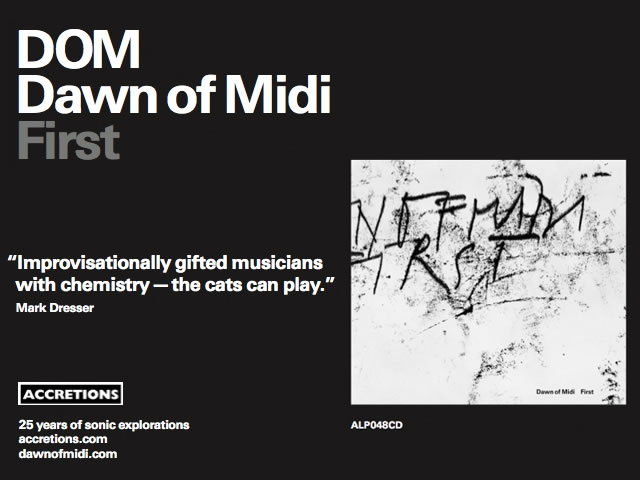Moment's Notice
Reviews of Recent Recordings
(continued)
Odean Pope Octet
Odean’s List
In and Out IOR CD 77102-2
Odean Pope Quartet
Fresh Breeze
CIMP 378
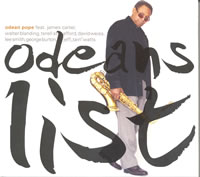
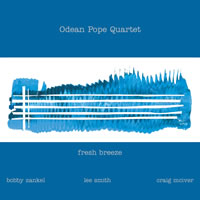 Philadelphia tenor saxophonist Odean Pope sounds so vital and alive on these two new CDs. At 72, his sound is still robust, although darkened a bit with age, which only lends his tone more gravitas, a certain stern wisdom. His phrasing is still superhumanly fast and precise and his encyclopedic knowledge of harmony deployed with off-hand virtuosity. Few improvisers can manhandle changes with the same audacity and authority or nail every sixteenth note in a phrase with the same sharp definition as he can.
Philadelphia tenor saxophonist Odean Pope sounds so vital and alive on these two new CDs. At 72, his sound is still robust, although darkened a bit with age, which only lends his tone more gravitas, a certain stern wisdom. His phrasing is still superhumanly fast and precise and his encyclopedic knowledge of harmony deployed with off-hand virtuosity. Few improvisers can manhandle changes with the same audacity and authority or nail every sixteenth note in a phrase with the same sharp definition as he can.
Fresh Breeze features Pope fronting an all Philly quartet with alto saxophonist Bobby Zankel, bassist Lee Smith, and drummer Craig McIver that patrols the outer edges of post bop and modal jazz. The open expanses of pianoless groups have always been a good fit for Pope’s concept. Some of his best work on record comes from his long tenure in Max Roach’s pianoless quartet. He’s also led his own trios – an early one with Cornell Rochester and Gerald Veasley comes immediately to mind, along with others that included either bassist Smith or Tyrone Brown and drummer McIver. Although he’s worked with pianists like Dave Burrell and Hassan Ibn Ali, Pope doesn’t necessarily need one, since he generally will fill in all the harmonic cracks anyway as he steamrolls through his solo. They give him the space he needs to work out his harmonic ideas at length.
In the company of Zankel, Smith, and McIver, who can more than hold up their end of the musical dialog, Fresh Breeze is a lively interactive album. Pope communicates his pleasure in the executing the physical and mental feats heard as he works his mazy way through the changes. On “Fifth House” he pours out notes in a thick carpet of sound with surprising irregularities in the phrasing hidden among the steep contours. Sometimes, he sounds as if he is merely pitting himself against the harmonic structure, grinding his way through them matter-of-factly to show it can be done. But darker emotions lurk in the midst of the confidence joyfulness than permeates most of the music, and solos are liable to suddenly flash menace or outrage or reveal a vein of deep sadness. Happily, Pope is still searching and using new approaches. On “Limu” and “Trilogy,” he places a new emphasis on lovely long tones to space out more headlong lines.
Zankel is a master at linking sounds and notes into cohesive phrases, building tension with streams of notes and releasing the pent up emotion with brilliant wails and cries. The vocal qualities of his sound are on display in “Trilogy.” Technically, he’s a good match for Pope. They pull off a brisk unison reading of “Limu” and engage in some amiable jousting during the collective passages of “Off If Not.” Smith drives the band with admirable energy, and he makes some surprising choices as he accompanies soloists. On”Morning Mist,” he leaves space in his lines in unexpected places, creating independent melodic lines that fall neatly in sync with the soloists. McIver very nearly steals the show, which is saying a lot in this company. He swings like a demon, and keeps up a continuous flow of dancing accents and fills, and contrapuntal rhythmic figures that drive the music. He’s the most undervalued drummer in jazz today.
Odean’s List features Pope’s large ensemble writing and arranging, which gets to an exultant gospel choir feeling by way of advanced jazz harmony and odd meters. Pope’s compositions can sound like exercises sometimes, but the spirited readings by the octet livens them up. The execution is exact, as might be expected, which lends streamlined speed “To the Roach” and “Collections.” The band is stocked with excellent soloists as well. James Carter – heard exclusively on baritone saxophone – turns on his avant-garde bar walker funk on “Collections” and “Phrygian Love Theme” circular breathing and roaring his way through two visceral solos. Tenorist Walter Blandings, a young Wynton Marsalis Sextet alumnus, handles the challenging “To the Roach” with bad-ass self-possession and a big, assertive swing era sound. Trumpeter Terell Stafford is another stand out soloist, with a buoyant sweet-nasty sound and an elegant melodic sense. Pope presides over them all like the elder statesman that he is, delivering commanding ballad performances on “Say It Over and Over Again” and sounding at home with the blues on an especially inventive “Blues for 8.”
–Ed Hazell
Ned Rothenberg
Quintet for Clarinet And Strings
Tzadik 8073
Ned Rothenberg
Ryu Nashi/No School-New Music for Shakuhachi
Tzadik 7267
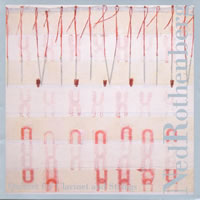
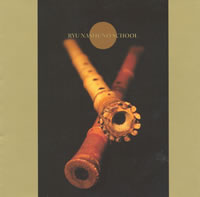 A renowned composer and improviser whose virtuosity on the Japanese shakuhachi is every bit as compelling as his work on clarinet, flute, alto saxophone or bass clarinet, New York-based multi-instrumentalist Ned Rothenberg presents two very different facets of his artistry on Quintet for Clarinet and Strings and Ryu Nashi/No School-New Music For Shakuhachi. Though both albums feature heavily notated compositions, the former session embraces Western concepts more readily than the later, which is steeped in Eastern tonalities and Japanese folk music traditions.
A renowned composer and improviser whose virtuosity on the Japanese shakuhachi is every bit as compelling as his work on clarinet, flute, alto saxophone or bass clarinet, New York-based multi-instrumentalist Ned Rothenberg presents two very different facets of his artistry on Quintet for Clarinet and Strings and Ryu Nashi/No School-New Music For Shakuhachi. Though both albums feature heavily notated compositions, the former session embraces Western concepts more readily than the later, which is steeped in Eastern tonalities and Japanese folk music traditions.
A graduate of Oberlin Conservatory and the Berklee School of Music, Rothenberg's neo-classical "Quintet for Clarinet and Strings" combines formalist writing with polyrhythmic, polyphonic and microtonal techniques. Joined by the Mivos Quartet, Rothenberg enjoys the support of an ensemble that specializes in the works of contemporary composers.
The lengthy "Terrace and Fold" opens the five part suite, with each member of the quintet playing similar phrases in different time signatures, at different metric lengths, which provides an element of contrasting rhythmic tension. "Interleaving" suspends the cantilevered effect of the opening section with a string of languid glissandos, building to a vibrant, African-influenced polyrhythmic ostinato that is deconstructed in the third part, "Commentary." Freely improvised, "Commentary" is well-integrated into the fabric of the suite's through-composed segments, drawing from various motifs for thematic material. The austere "Setting Stones" is the traditional slow movement, while "Finale" lives up to its name, as Rothenberg's clarinet spars and feints with animated strings.
The influence of Brahms and Mozart is subtly interwoven into "Quintet for Clarinet and Strings," an aesthetic that only partially materializes on Ryu Nashi/No School-New Music for Shakuhachi. As a former student of both Yamaguchi Goro and Yokoyama Katsuya (two masters of the shakuhachi with different approaches towards phrasing, vibrato, pitch and tone color), Rothenberg has enjoyed the perspective of an outsider while studying traditional Japanese music.
Embodying aspects of Japanese formalism, the solo pieces "Emergent Vessel" and "Shadow Detail," as well as the shakuhachi duo "Cloud Hands" each draw from the meditative aesthetic of honkyoku. Embracing concepts culled from divergent schools of thought, Rothenberg uses shifts in pitch and changes in note intervals that are unusual in the broader spectrum of shakuhachi technique, lending the pieces a slightly unorthodox tonality when compared to traditional Japanese folk music.
Though the classical pairing of shakuhachi and jiuta shamisen on "Naki Tokoro Nite (Where There is Neither)" embodies the austere tonality of sankyoku tradition, Rothenberg incorporates Western counterpoint, contrary motion and a rhythmic character derived from the cadences of Japanese poetry such as haiku and tanka, rather than sankyoku's usual 2/4 meter. "Dan no Tabi (Journey on a Staircase)" also uses canonic and contrary motion as a compositional device – unorthodox concepts in Japanese traditional music that is further emphasized by the rich, sinewy tone of Stephanie Griffin's haunting viola.
Rothenberg's interest in subtly manipulating traditional forms and approaches is implicit throughout these two albums, offering dramatically different perspectives to an all-encompassing multi-cultural aesthetic.
-Troy Collins
Alexander von Schlippenbach
Live in Berlin
Jazzwerkstatt JW 2003
 Though the milestone is not mentioned anywhere in its documentation, the three-part concert presented on this DVD coincided with Alexander von Schlippenbach’s 70th birthday. Recorded in Berlin in September 2008, the program includes four solo piano works, four pieces from Schlippenbach Trio’s Gold is where you find it (Intakt; 2007) with saxophonist Evan Parker and drummer Paul Lovens, and a reprise of “Globe Unity 40” that features a line-up almost evenly divided between first-generation improvisers like drummer Paul Lytton, and saxophonists Gerd Dudek and Ernst-Ludwig Petrowsky, and youngbloods like altoist Henrik Walsdorff and trombonists Chistof Thewes and Nils Wogram. For the most part, the production values of each approximately 45-minute segment are impeccable: the shot selections are cleanly designed; there’s a brisk but unhurried visual pace; and, for the most part, the audio is excellent. The exception is the sound for the Globe Unity segment, which seems to be captured by a pair of shotgun mics suspended from the ceiling of the hall, diminishing the impact of soloists when the ensemble roars behind them, and smudging the details of the tuttis. Still, the sheer voltage of the music and the heartening sight of new school German improvisers like trumpeter Axel Dörner standing beside a pioneer like trumpeter Manfred Schoof is ample compensation. Additionally, the vantages provided by the adept camera work reveal Schlippenbach’s riveting concentration. Whether rendering the score of a complex piece like “Twelve Tone Tales” or reaching gale force improvising on “Fast Winds,” the solo set reveals the efficiency of Schlippenbach’s mechanics and how it contributes to the beauty and intensity of his music. The trio set shows how the direct sight line created by the unorthodox placement of Lovens’ kit to the piano facilitates Schlippenbach’s anticipation of and response to the mercurial drummer’s every move. While the semi-circular positioning of the horns blocks Schippenbach’s ability to see every musician, particularly when a soloist steps to the foreground, he is nevertheless able to triangulate with Lovens and Lytton (the latter being positioned behind the horns), and provide the necessary modulations of rhythmic feel to shape the performance. Similarly, the ability to see the horn players eye each other as an ensemble passage either ramps up or tapers off as a soloist emerges is key to appreciating the seamless development of a Globe Unity blow. The Globe Unity performance also reveals something of a generational difference in body language, as the veterans, despite the heat of their respective contributions, tend to project a cooler presence than newer members like bass clarinetist Rudi Mahall, who always seem primed to launch into orbit. While this comingling of seasoned stalwarts and their younger, well-stoked counterparts is now part and parcel of Globe Unity’s ongoing vitality, Schlippenbach remains its root.
Though the milestone is not mentioned anywhere in its documentation, the three-part concert presented on this DVD coincided with Alexander von Schlippenbach’s 70th birthday. Recorded in Berlin in September 2008, the program includes four solo piano works, four pieces from Schlippenbach Trio’s Gold is where you find it (Intakt; 2007) with saxophonist Evan Parker and drummer Paul Lovens, and a reprise of “Globe Unity 40” that features a line-up almost evenly divided between first-generation improvisers like drummer Paul Lytton, and saxophonists Gerd Dudek and Ernst-Ludwig Petrowsky, and youngbloods like altoist Henrik Walsdorff and trombonists Chistof Thewes and Nils Wogram. For the most part, the production values of each approximately 45-minute segment are impeccable: the shot selections are cleanly designed; there’s a brisk but unhurried visual pace; and, for the most part, the audio is excellent. The exception is the sound for the Globe Unity segment, which seems to be captured by a pair of shotgun mics suspended from the ceiling of the hall, diminishing the impact of soloists when the ensemble roars behind them, and smudging the details of the tuttis. Still, the sheer voltage of the music and the heartening sight of new school German improvisers like trumpeter Axel Dörner standing beside a pioneer like trumpeter Manfred Schoof is ample compensation. Additionally, the vantages provided by the adept camera work reveal Schlippenbach’s riveting concentration. Whether rendering the score of a complex piece like “Twelve Tone Tales” or reaching gale force improvising on “Fast Winds,” the solo set reveals the efficiency of Schlippenbach’s mechanics and how it contributes to the beauty and intensity of his music. The trio set shows how the direct sight line created by the unorthodox placement of Lovens’ kit to the piano facilitates Schlippenbach’s anticipation of and response to the mercurial drummer’s every move. While the semi-circular positioning of the horns blocks Schippenbach’s ability to see every musician, particularly when a soloist steps to the foreground, he is nevertheless able to triangulate with Lovens and Lytton (the latter being positioned behind the horns), and provide the necessary modulations of rhythmic feel to shape the performance. Similarly, the ability to see the horn players eye each other as an ensemble passage either ramps up or tapers off as a soloist emerges is key to appreciating the seamless development of a Globe Unity blow. The Globe Unity performance also reveals something of a generational difference in body language, as the veterans, despite the heat of their respective contributions, tend to project a cooler presence than newer members like bass clarinetist Rudi Mahall, who always seem primed to launch into orbit. While this comingling of seasoned stalwarts and their younger, well-stoked counterparts is now part and parcel of Globe Unity’s ongoing vitality, Schlippenbach remains its root.
–Bill Shoemaker
Fred Van Hove + Paul Dunmall + Paul Rogers + Paul Lytton
Asynchronous
Slam SLAMCD 28
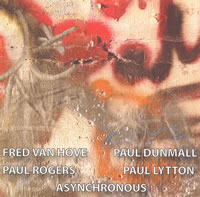 Pianist Fred Van Hove, tenor saxophonist Paul Dunmall, bassist Paul Rogers, and drummer Paul Lytton are an experienced, polished quartet of improvisers and that is perhaps both their great strength and their weakness. One can’t help but admire how effortlessly they work together, how precisely they express themselves, and the elegance and energy of the overall performance. At the same time, a certain structural fatigue sets in during the 45-minute improvisation that takes up most of the album. The music begins in anticipatory quiet, builds and subsides, builds and subsides, until you can almost anticipate the next direction they’ll take after each climax. It’s a common enough form for a free improvisation to take, but it seems overly familiar. It’s as if they fell into the advance-recede shape out of habit. Of course, Coltrane could play “My Favorite Things” or Bird could play “Ornithology” hundreds of times and usually find something fresh to say each time. And that is certainly the case here. They are indeed resourceful musicians and there are moments of extraordinary beauty and occasional surprise throughout the performance. Everything fits together so well. Anyone can take on a lead role in the melody, rhythm, texture, or color of any given passage. They all make interesting choices of what to contribute at any given time, whether it’s a contrasting element, a sound that helps blend and thicken the sound, or dropping out entirely and letting others develop the spontaneous composition. Perhaps because of its shorter length, “Moves” sounds more purposeful. It’s certainly more homogenous. Taken at a brisk tempo for the most part, it barrels along with only minor fluctuations in the energy level. The momentum carries the band forward without sacrificing any of the subtle judgments that give their music such lovely detail. This is the kind of album that path breakers make late in their careers – music of great refinement, rather than great innovation.
Pianist Fred Van Hove, tenor saxophonist Paul Dunmall, bassist Paul Rogers, and drummer Paul Lytton are an experienced, polished quartet of improvisers and that is perhaps both their great strength and their weakness. One can’t help but admire how effortlessly they work together, how precisely they express themselves, and the elegance and energy of the overall performance. At the same time, a certain structural fatigue sets in during the 45-minute improvisation that takes up most of the album. The music begins in anticipatory quiet, builds and subsides, builds and subsides, until you can almost anticipate the next direction they’ll take after each climax. It’s a common enough form for a free improvisation to take, but it seems overly familiar. It’s as if they fell into the advance-recede shape out of habit. Of course, Coltrane could play “My Favorite Things” or Bird could play “Ornithology” hundreds of times and usually find something fresh to say each time. And that is certainly the case here. They are indeed resourceful musicians and there are moments of extraordinary beauty and occasional surprise throughout the performance. Everything fits together so well. Anyone can take on a lead role in the melody, rhythm, texture, or color of any given passage. They all make interesting choices of what to contribute at any given time, whether it’s a contrasting element, a sound that helps blend and thicken the sound, or dropping out entirely and letting others develop the spontaneous composition. Perhaps because of its shorter length, “Moves” sounds more purposeful. It’s certainly more homogenous. Taken at a brisk tempo for the most part, it barrels along with only minor fluctuations in the energy level. The momentum carries the band forward without sacrificing any of the subtle judgments that give their music such lovely detail. This is the kind of album that path breakers make late in their careers – music of great refinement, rather than great innovation.
-Ed Hazell
